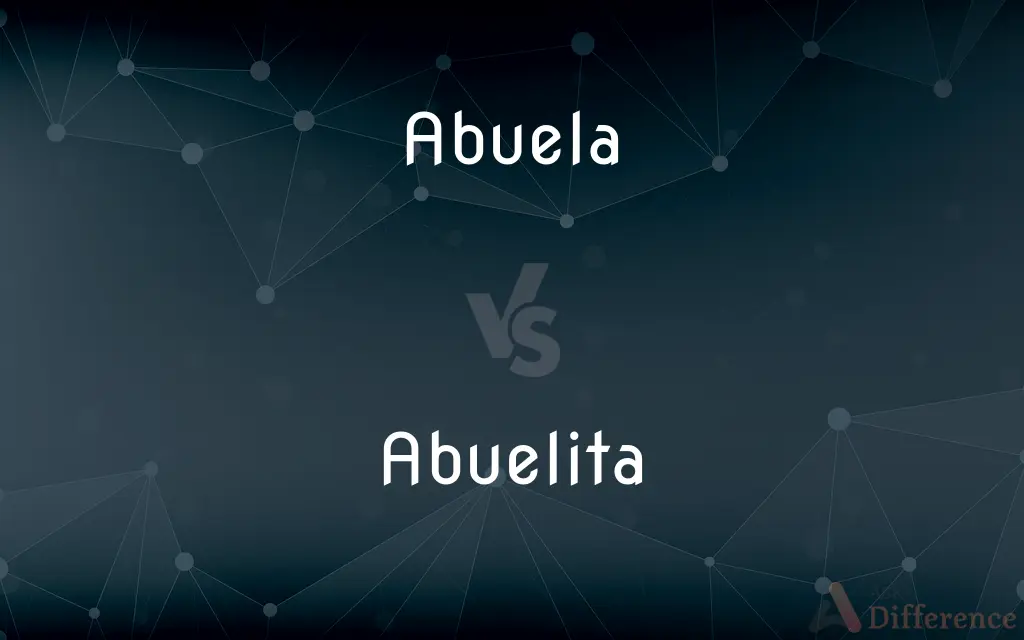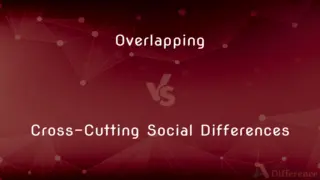Abuela vs. Abuelita — What's the Difference?
Edited by Tayyaba Rehman — By Fiza Rafique — Published on December 9, 2023
"Abuela" is Spanish for "grandmother"; "Abuelita" is a diminutive, endearing term meaning "little grandmother" or "granny".

Difference Between Abuela and Abuelita
Table of Contents
ADVERTISEMENT
Key Differences
"Abuela" is the Spanish term used to describe one's grandmother. In many Spanish-speaking cultures, family is deeply revered, and the term is one of respect and recognition. On the other hand, "Abuelita" is a more affectionate term that uses the diminutive form to show added warmth and affection.
"Abuela" is a term you'll commonly find in formal contexts or when referring to a grandmother without any added layers of intimacy. In contrast, "Abuelita" is a term you'd use in more intimate, affectionate settings, perhaps when talking to your grandmother or about her with fondness.
While both "Abuela" and "Abuelita" refer to the same family member, the nuance in their usage is noteworthy. Using "Abuela" may indicate a more neutral or formal reference, while "Abuelita" brings a softness and warmth, emphasizing a closer emotional connection.
In Spanish, diminutives are commonly used to denote affection, not necessarily size. Hence, "Abuelita" doesn't imply a small grandmother but rather an endearing one. Conversely, "Abuela" stands as the standard term without the added nuance of sentiment.
The choice between "Abuela" and "Abuelita" can signify the nature of one's relationship with their grandmother or the context in which they're speaking about her. A more formal or distant relationship might utilize "Abuela", while a loving, close bond might be better represented by "Abuelita".
ADVERTISEMENT
Comparison Chart
Meaning
Grandmother
Little Grandmother/Granny
Tone
Neutral/Formal
Affectionate/Endearing
Diminutive
No
Yes
Common Context
Formal conversations
Intimate, familiar contexts
Emotional Connection Implied
Not necessarily
Yes, a close bond
Compare with Definitions
Abuela
"Abuela" is used in formal or neutral contexts.
Is that your Abuela over there?
Abuelita
"Abuelita" denotes warmth and closeness.
My Abuelita always tells the best stories.
Abuela
"Abuela" denotes the senior matriarch in a family.
My Abuela is the head of our family.
Abuelita
"Abuelita" is a diminutive form in Spanish.
Come give Abuelita a hug.
Abuela
"Abuela" is the Spanish word for grandmother.
My Abuela lives in Madrid.
Abuelita
"Abuelita" is an affectionate term for grandmother.
I baked cookies with my Abuelita today.
Abuela
"Abuela" is a term of familial recognition.
I learned many recipes from my Abuela.
Abuelita
"Abuelita" adds a layer of sentiment to the term "Abuela".
I feel safe and loved with my Abuelita.
Abuela
"Abuela" refers to a maternal or paternal grandmother.
I visited my Abuela during summer vacations.
Abuelita
"Abuelita" often implies a cherished relationship.
My Abuelita is my favorite person in the world.
Common Curiosities
When would one use "Abuela" over "Abuelita"?
"Abuela" is more neutral/formal, while "Abuelita" is used in affectionate contexts.
Is it disrespectful to use "Abuelita"?
No, it's an endearing term and is used to show affection and warmth.
What does "Abuela" mean?
"Abuela" is the Spanish word for "grandmother".
Can "Abuelita" be used for someone who's not your grandmother?
It can be used affectionately for elderly women one is close to, not strictly limited to biological grandmothers.
Is "Abuelita" just another word for "Abuela"?
"Abuelita" is a diminutive, affectionate term for "Abuela", meaning "little grandmother" or "granny".
Does "Abuelita" mean a small grandmother?
No, the diminutive in Spanish often shows affection, not size.
Is it common to use diminutives like "Abuelita" in Spanish?
Yes, diminutives are frequently used in Spanish to show affection.
How important are terms like "Abuela" and "Abuelita" in Hispanic cultures?
They're significant, as family is a central aspect of many Hispanic cultures.
Is "Abuela" used universally in all Spanish-speaking countries?
While the meaning is universal, regional variations and slang might exist.
Does "Abuelita" have any cultural significance?
It emphasizes the warm, affectionate relationships valued in many Spanish-speaking cultures.
Can "Abuelita" be used for great-grandmothers too?
Yes, it can be used affectionately for any grandmotherly figure.
Why is the diminutive form used for family terms in Spanish?
It's a cultural way to show affection and closeness.
How do you decide between using "Abuela" and "Abuelita"?
It depends on the context and the nature of your relationship; "Abuela" is more neutral, while "Abuelita" is affectionate.
Can males use "Abuelita" to refer to their grandmothers?
Yes, the term is not gender-specific in its usage.
What's the male equivalent for "Abuela" and "Abuelita"?
"Abuelo" is the male equivalent of "Abuela", and "Abuelito" is for "Abuelita".
Share Your Discovery

Previous Comparison
5’10 vs. 6’0
Next Comparison
Overlapping vs. Cross-Cutting Social DifferencesAuthor Spotlight
Written by
Fiza RafiqueFiza Rafique is a skilled content writer at AskDifference.com, where she meticulously refines and enhances written pieces. Drawing from her vast editorial expertise, Fiza ensures clarity, accuracy, and precision in every article. Passionate about language, she continually seeks to elevate the quality of content for readers worldwide.
Edited by
Tayyaba RehmanTayyaba Rehman is a distinguished writer, currently serving as a primary contributor to askdifference.com. As a researcher in semantics and etymology, Tayyaba's passion for the complexity of languages and their distinctions has found a perfect home on the platform. Tayyaba delves into the intricacies of language, distinguishing between commonly confused words and phrases, thereby providing clarity for readers worldwide.












































